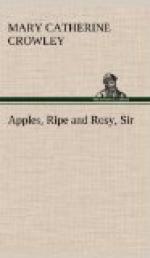Tom lost no time now in getting home. A little later he had entered a spacious brick house on Florence Street, deposited the milk can on the kitchen table, set the cook a laughing by some droll speech, and, passing on, sought his mother in her cheerful sitting-room.
“Why, my son, what delayed you so long?” she inquired, folding away her sewing; for it was becoming too dark to work.
“Oh, I went home with Missis Barry!” he answered, with the matter-of-fact air with which he might have said that he had been escorting some particular friend of the family.
Mrs. Norris smiled and drew nearer to the bright fire which burned in the grate. Tom slipped into a seat beside her upon the wide, old-fashioned sofa, which was just the place for one of those cosy twilight chats with mother, which boys especially love so much, and the memory of which gleams, star-like, through the mists of years, exerting even far greater influence than she dreams of upon their lives. Tom considered this quiet half hour the pleasantest of the day. Mrs. Norris, with a gentle wisdom worthy of wider imitation, encouraged him to talk to her about whatever interested him. She was seldom too tired or too preoccupied at this time to hear of the mechanism of the steam-engine, the mysteries of the printing-press, or the feats that may be performed with a bicycle,—of which “taking a header,” or the method by which the rider learns to fly off the machine head foremost into a ditch with impunity, appeared to be the most desirable. Her patience in this respect was rewarded by that most precious possession to a mother, a son’s confidence.
Tom liked to tell her of various things that happened during the day; to compare notes, and get her opinions of matters in general; at the same time giving his own, which were often quaint and entertaining.
“Really, mother, Missis Barry knows a lot!” he now exclaimed, abruptly, clasping his knee and staring at the fire in a meditative manner.
Mrs. Norris looked amused, but she did not venture to question the apple-vender’s wisdom. One or two kindly inquiries about the old woman, however, prompted him to speak of her further,—of his meeting her as she struggled along with her burden, his drawing it on the sled, and last of her refusal of the drink he offered.
“You would not have minded, would you, mother?” he asked.
“No, not for the sake of the milk, certainly,” responded Mrs. Norris, laughing; “but—” then she hesitated. How could she hamper the mind of this ingenuous little lad of hers with false and finical ideas of refinement and delicacy! Why should she suggest to him that it is at least not customary to go about giving the poor to drink out of our own especial milk cans? There came to her mind the noble lines which but frame as with jewels the simple Christian precept,—the words spoken to Sir Launfal when, weary, poverty-stricken, and disheartened, the knight returns from his fruitless search for the Holy Grail; when humbly he shares his cup and crust with the leper at the gate,—the leper who straightway stands before him glorified, a vision of Our Lord, and tells him that true love of our neighbor consists in,




